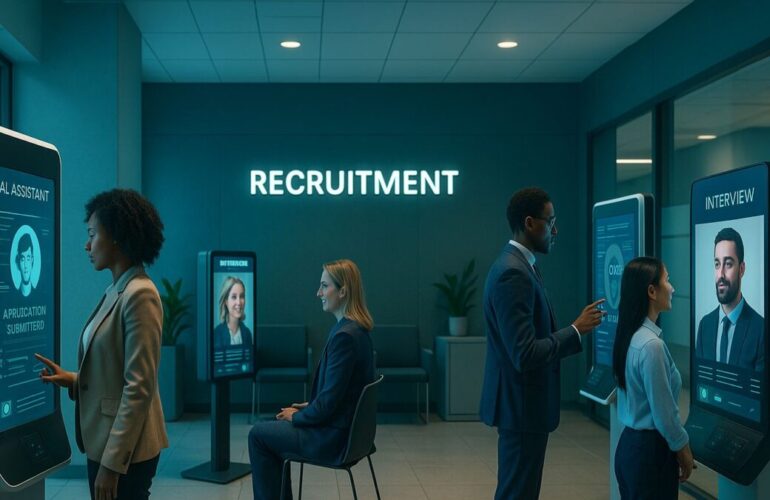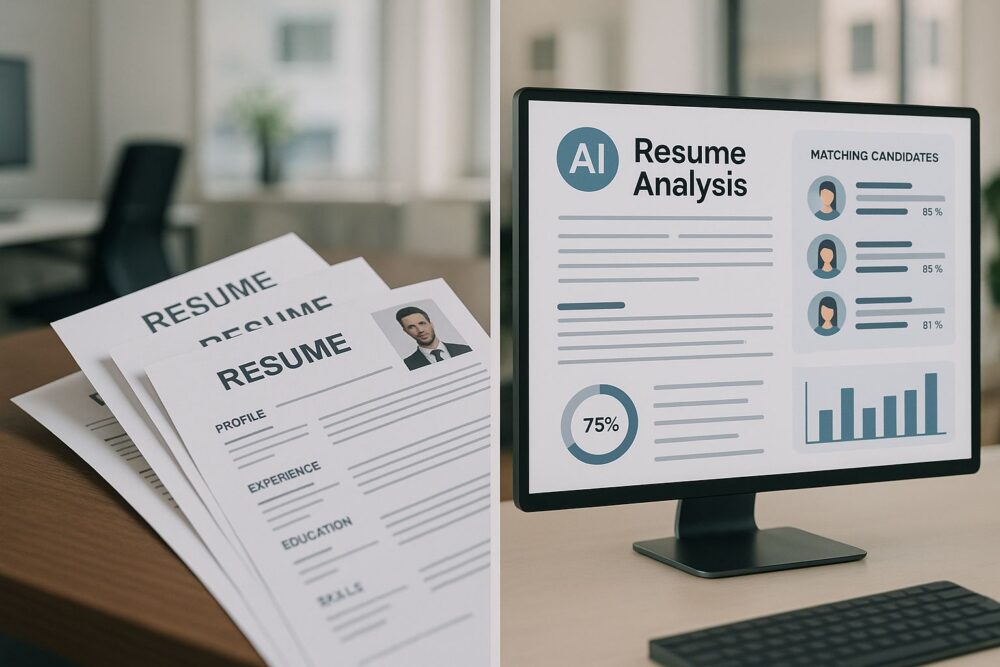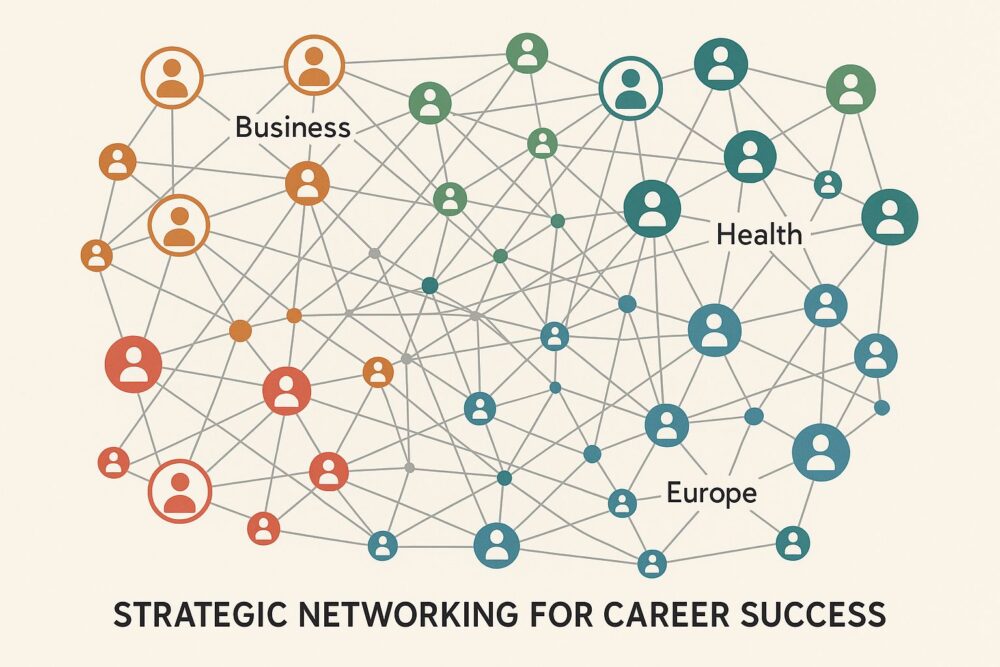AI Hiring Revolution 2025 Job Market Guide
The recruitment landscape has fundamentally transformed. AI hiring technologies are reshaping how companies find talent and how job seekers navigate career opportunities. Understanding these changes is crucial for success in today’s competitive job market.
AI Hiring Revolution: The New Reality of AI Hiring
AI hiring has moved from experimental technology to standard practice across industries. Recent data shows 87% of companies now use AI tools, with 65% of recruiters actively implementing artificial intelligence in their daily processes.
This shift affects everyone from fresh graduates entering the job market to experienced professionals seeking career advancement. AI systems screen resumes, conduct initial interviews, and even predict candidate success rates with remarkable accuracy.
Market Transformation Data
The numbers tell a compelling story about AI hiring adoption. Companies report 67% time savings in recruitment processes, while candidate screening costs have dropped by 75%. These efficiency gains allow recruiters to focus on relationship building and strategic talent planning.
AI hiring platforms process applications 80% faster than traditional methods. For job seekers, this means quicker responses and streamlined application processes. However, it also means your resume must be optimized for artificial intelligence screening systems.
Impact on Job Seekers
AI hiring creates both opportunities and challenges for job seekers. Understanding how these systems work is essential for successful job searching in 2025.
Resume Optimization for AI Hiring
Modern AI hiring systems scan resumes for specific keywords, skills, and experience patterns. Job seekers must adapt their applications to match these requirements while maintaining authenticity and personal branding.
Successful candidates optimize their resumes for AI by including exact keyword matches from job descriptions, quantifying achievements with specific metrics, and using standard formatting that artificial intelligence can easily parse.
The key is balancing AI hiring optimization with human appeal. While algorithms screen initial applications, human decision-makers still make final hiring choices.
Skill Development Priorities
AI hiring has shifted employer priorities toward specific skill sets. Technical competencies remain important, but soft skills like creativity, emotional intelligence, and complex problem-solving are increasingly valuable.
Job seekers should develop AI awareness understanding how artificial intelligence affects their industry and demonstrating ability to work alongside automated systems. This knowledge becomes a competitive advantage in the modern job market.
Employer Advantages
Companies implementing AI hiring gain significant competitive advantages in talent acquisition. These benefits extend beyond cost savings to include improved hiring quality and reduced bias in selection processes.
Quality Improvements
AI hiring systems analyze successful employee patterns, identifying candidates likely to excel in specific roles and organizational cultures. This predictive capability improves long-term hiring outcomes and reduces expensive turnover.
Organizations using AI hiring report 35% improvement in employee retention rates and 25% faster time-to-productivity for new hires. These metrics demonstrate the technology’s impact on business performance.
Bias Reduction
Properly implemented AI hiring reduces unconscious bias in recruitment processes. Artificial intelligence focuses on qualifications and skills rather than demographic characteristics, creating more equitable hiring practices.
Companies leveraging AI hiring for bias reduction report more diverse candidate pools and improved workplace inclusion metrics. This alignment with diversity goals drives additional adoption across industries.
Industry-Specific Applications
AI hiring adoption varies across sectors, with technology, finance, and healthcare leading implementation efforts. Understanding industry-specific trends helps both job seekers and employers optimize their strategies.
Technology Sector
Tech companies pioneered AI hiring and continue pushing innovation boundaries. These organizations use artificial intelligence for technical skill assessment, coding challenges, and cultural fit prediction.
AI in technology focuses heavily on practical skills demonstration rather than traditional interview processes. Candidates benefit from building portfolios showcasing real-world applications and technical problem-solving abilities.
Traditional Industries
Healthcare, manufacturing, and professional services are rapidly adopting AI for volume recruitment and specialized role filling. These sectors value the technology’s ability to identify candidates with specific certifications and experience requirements.
AI helps traditional industries compete for talent against technology companies by streamlining processes and improving candidate experience during recruitment.
Regional Market Dynamics
AI hiring adoption rates vary significantly across global markets. The Middle East, particularly the UAE, has emerged as a leader in artificial intelligence recruitment technologies.
Middle East Leadership
The UAE’s strategic focus on artificial intelligence has accelerated AI hiring implementation across the region. Government initiatives supporting technology adoption create favorable environments for recruitment innovation.
Companies in the UAE benefit from diverse talent pools and advanced AI infrastructure. The region’s position as a global business hub attracts international professionals familiar with artificial intelligence recruitment processes.
Global Talent Mobility
AI hiring facilitates international recruitment by standardizing skill assessment and cultural fit evaluation. This capability particularly benefits regions like the UAE that rely on global talent attraction.
Professionals seeking international opportunities must understand AI systems in their target markets. Different regions emphasize varying skills and experience patterns in their artificial intelligence recruitment algorithms.
Preparing for the Future
AI hiring will continue evolving, with new technologies enhancing recruitment efficiency and candidate experience. Staying informed about these developments is crucial for long-term career success.
Emerging Technologies
Natural language processing improvements enable AI systems to better understand resume context and candidate communication styles. Video interview analysis provides insights into soft skills and personality traits.
These advancing AI capabilities require job seekers to develop comfort with technology-mediated recruitment processes while maintaining authentic personal presentation.
Adaptation Strategies
Success in the AI hiring era requires continuous learning and adaptation. Job seekers should regularly update their skills, optimize their digital presence, and understand industry-specific recruitment trends.
Employers must balance AI efficiency with human judgment, ensuring technology enhances rather than replaces meaningful candidate evaluation.
Strategic Recommendations
The AI hiring revolution offers opportunities for those who understand and adapt to its requirements. Both job seekers and employers benefit from strategic approaches to artificial intelligence recruitment.
For Job Seekers
Master AI hiring optimization techniques while developing skills that complement artificial intelligence. Focus on creativity, emotional intelligence, and complex problem-solving abilities that remain uniquely human.
Build strong online professional profiles that showcase both technical competencies and soft skills. AI systems increasingly evaluate digital footprints and professional networking activities.
For Employers
Implement AI gradually, starting with high-volume positions and expanding to specialized roles as systems mature. Maintain human oversight to ensure quality and compliance with employment regulations.
Invest in AI training for recruitment teams, ensuring they understand both technological capabilities and limitations of artificial intelligence systems.
Conclusion
AI hiring represents a permanent shift in recruitment methodology. Success requires understanding these changes and adapting strategies accordingly. The organizations and individuals who embrace this transformation will thrive in the evolving job market.




